Key takeaways:
- Understanding telecom compliance requires ongoing learning and adaptation due to inconsistent regulations across regions and the complexities involved in compliance reporting.
- Compliance is essential for maintaining customer trust and protecting both the company and end-users, as seen in instances of data breaches and regulatory changes.
- Proactive strategies, such as training programs and technology implementation, can enhance compliance processes and foster a culture of transparency and accountability.
- Continuous learning and meticulous documentation are crucial in adapting to evolving regulations and ensuring compliance, ultimately building trust with stakeholders.
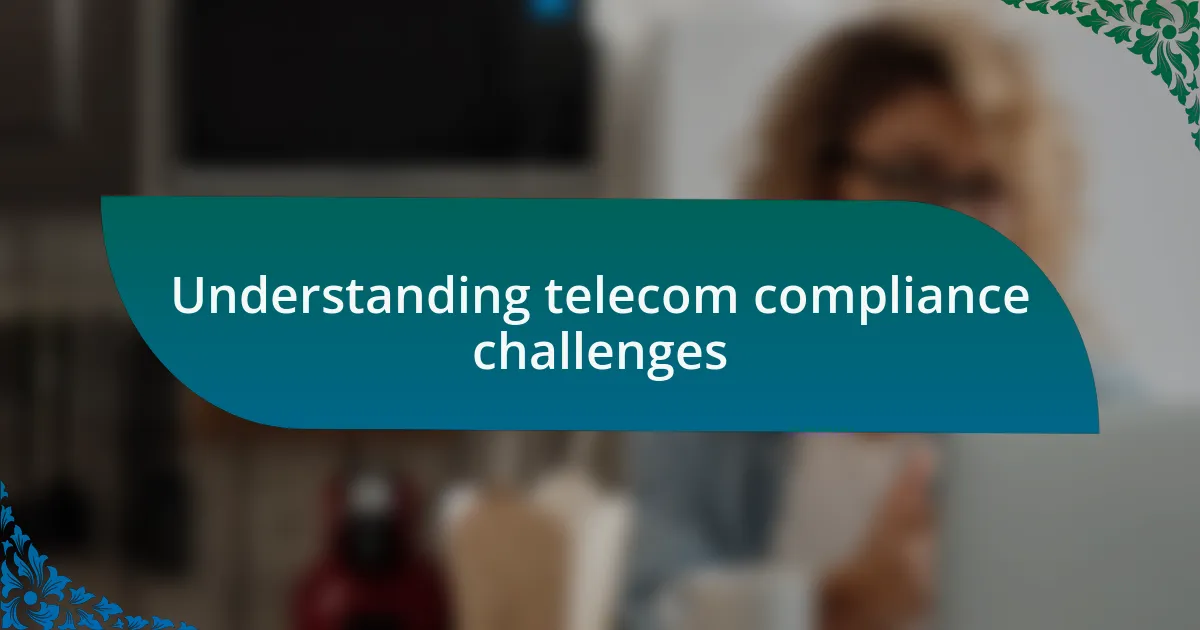
Understanding telecom compliance challenges
Navigating telecom compliance challenges can feel like walking through a maze. I remember a particular time when I first encountered a new regulation that seemed so complex, it left me feeling overwhelmed. How could I possibly ensure our practices aligned with these ever-changing rules? This experience taught me that understanding compliance isn’t just about memorizing regulations; it requires an ongoing commitment to learning and adapting.
One aspect I found particularly frustrating was the inconsistency in regulations across different regions. I often wondered, shouldn’t there be a more unified approach? Each time I had to adapt our strategies for compliance, it reminded me how important it is to stay informed about local laws and how they impact our operations. The emotional toll of uncertainty often pushed me to seek out resources and advice, feeling a blend of anxiety and determination.
Gathering the right data for compliance reporting also proved to be a daunting task. There were moments when I felt like I was searching for a needle in a haystack, trying to pull together information from various sources. What if I missed something vital? I found it essential to cultivate a culture of transparency and accuracy within my team. This experience emphasized the importance of collaboration and communication, which can mitigate compliance risks and foster a more knowledgeable environment.
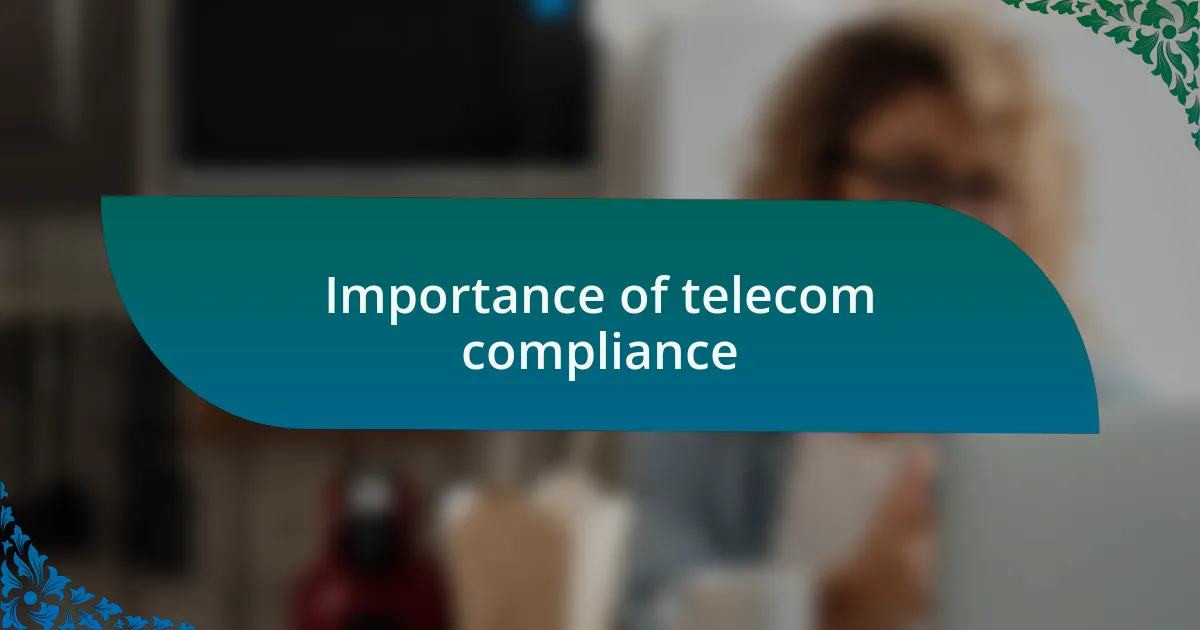
Importance of telecom compliance
Without a doubt, telecom compliance plays a crucial role in maintaining the integrity of the industry. I vividly recall a time when a sudden regulatory change impacted our service offerings almost overnight. It forced me to think critically about how we could adapt our operations while ensuring we remained compliant. Failing to do so could have risked not just our business but also the trust we had built with our customers.
Moreover, compliance is fundamental to protecting not just the company, but also the end-users. There was a moment when we discovered a potential data breach that could have compromised customer information. That incident underscored for me the direct connection between compliance and customer trust. How could we expect our clients to feel secure if we weren’t prioritizing these regulations? It’s an ongoing reminder that our adherence to compliance measures is ultimately a commitment to safeguarding our customers’ interests.
Finally, telecom compliance fosters a competitive edge in the market. I’ve learned that companies focused on compliance enjoy a better reputation among their peers and clients. This was evident when my team secured a significant contract, in part because we could demonstrate our adherence to stringent compliance standards. It raised an interesting question for me: Does compliance only serve as a barrier, or can it also be a gateway to new opportunities? My experience has shown that embracing compliance can truly serve as a catalyst for growth and innovation in the telecom sector.
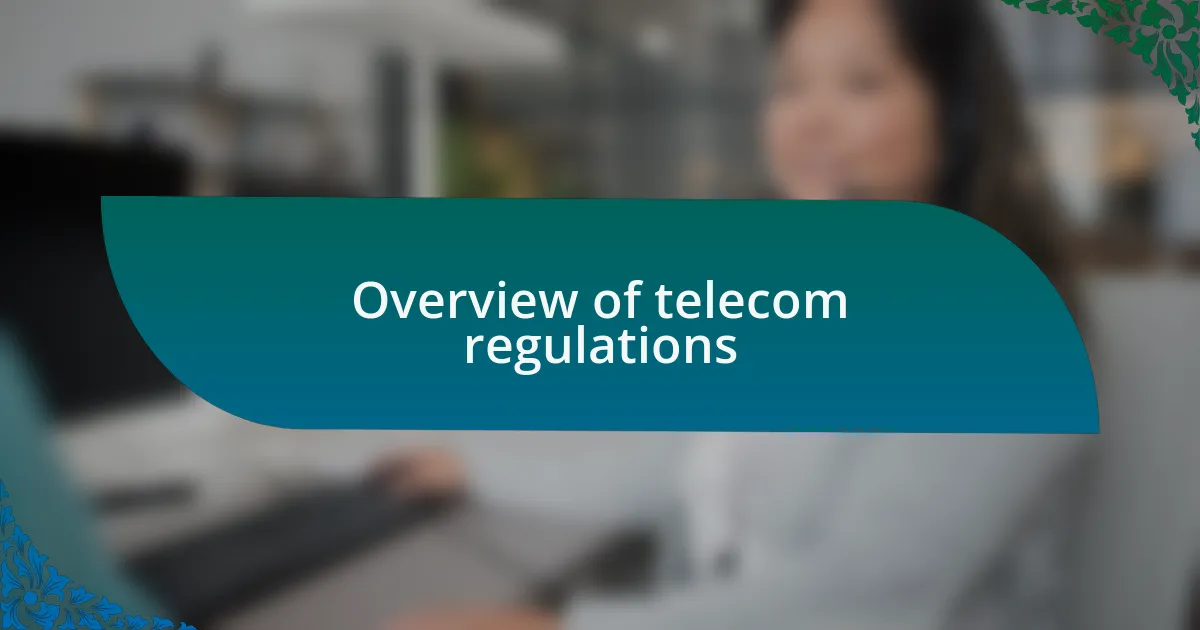
Overview of telecom regulations
Telecom regulations are a complex web of rules designed to ensure fair competition, consumer protection, and technical reliability. During my early days in the industry, I was often overwhelmed by the sheer volume of regulations we had to navigate. It made me wonder: How can anyone keep up with such rapid changes? Yet, understanding these regulations was critical—not only to our success but to maintaining the overall standards of the telecom ecosystem.
The landscape of telecom regulations varies significantly across regions, reflecting local laws, cultural values, and market conditions. I recall attending a conference where representatives from different countries shared their unique regulatory challenges. It was eye-opening to see how one region could prioritize data privacy while another focused on spectrum allocation. This disparity reminds me that compliance isn’t a one-size-fits-all approach; it requires a tailored strategy for every market.
Compliance doesn’t merely involve checking boxes; it demands a proactive stance towards evolving regulations. I remember an instance when we implemented a compliance training program that transformed our team’s approach to regulatory changes. It made me realize how empowering our employees with knowledge could lead to a culture of accountability and foresight. Isn’t it fascinating how a commitment to understanding regulations can shape an entire organization’s future?
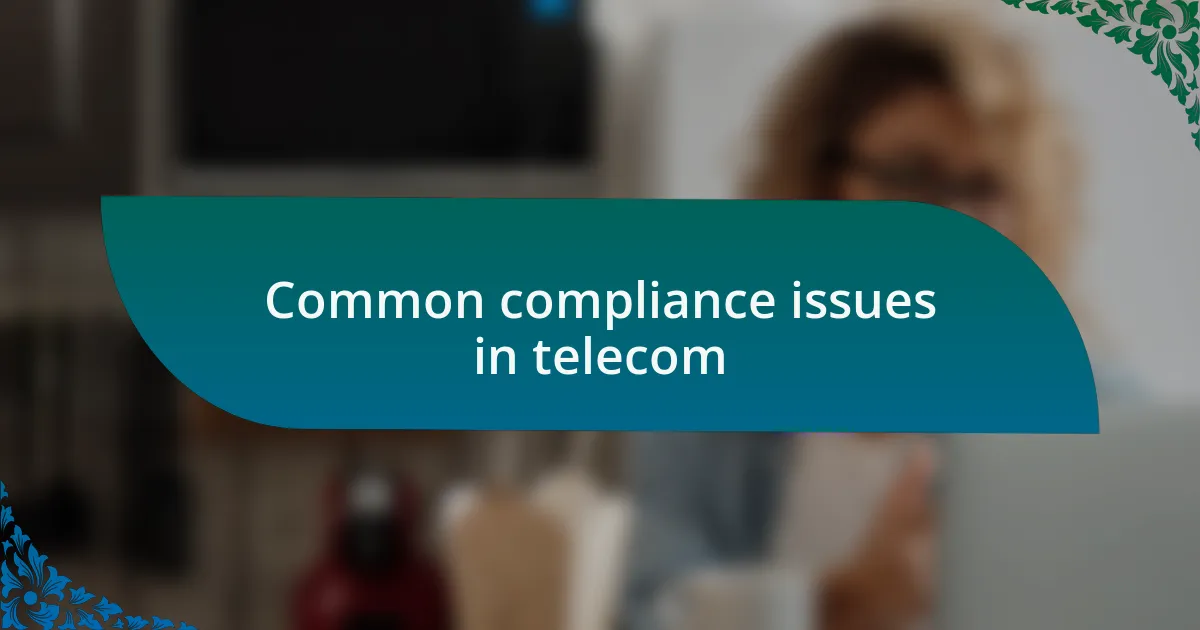
Common compliance issues in telecom
Navigating the tangled web of telecom compliance often brings to light issues like data security breaches. I can still recall the feeling of anxiety I experienced when a competitor faced a major data leak, triggering a ripple effect across the industry. It made me question, how resilient are our systems? Ensuring robust data protection is not just a regulatory obligation; it’s vital for maintaining customer trust.
Another significant issue arises from the constant evolution of licensing requirements. Early in my career, I remember scrambling to adapt to new regulations introduced at an unexpected quarterly review. It felt like a game of catch-up, and I often wondered if our team’s resources were sufficient. Licensing not only varies from one jurisdiction to another but also changes with emerging technologies, demanding our continuous attention.
Finally, I’ve seen firsthand how inconsistent practices in billing transparency can lead to compliance pitfalls. I once spoke to a frustrated customer who didn’t understand their charges due to vague terms and conditions. This experience reminded me of the importance of clear communication; compliance is as much about legal adherence as it is about fostering customer relationships. How are we ensuring our practices meet not just the letter of the law but also the spirit of customer trust?
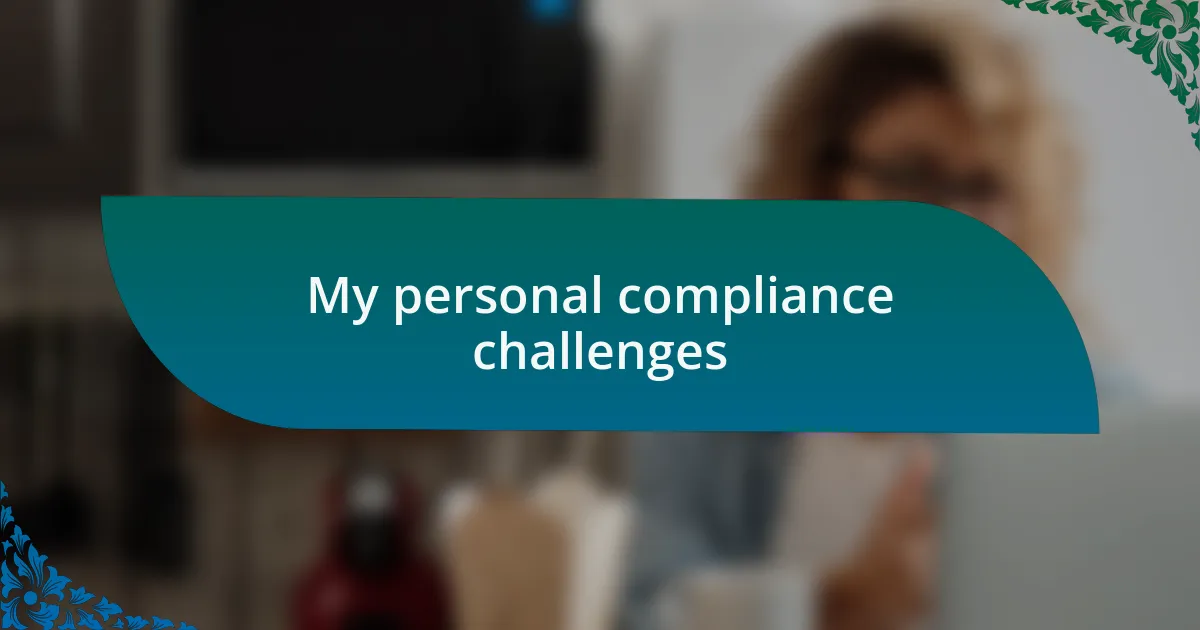
My personal compliance challenges
Throughout my journey in telecom compliance, I encountered my fair share of challenges that pushed me to adapt and learn swiftly. I recall a particularly stressful period when new regulations came into effect without much notice, and I felt overwhelmed navigating through the dense legal jargon. It was like trying to find my way through a fog—how could I ensure that our practices aligned with these sweeping changes?
One of my most significant struggles was keeping pace with the rapid technological advancements while ensuring compliance. There was an instance when we launched a new product, and I hadn’t anticipated specific compliance concerns tied to its innovative features. I remember the late nights spent pouring over documents, thinking, “What if we overlooked a key requirement?” This not only heightened my stress but also made me acutely aware of how crucial it is to foresee potential issues before they arise.
Additionally, I’ve grappled with the complexities of maintaining transparent communication with our customers regarding compliance matters. On one occasion, a client reached out, frustrated about hidden fees, and I could sense their disappointment. In that moment, I realized that compliance isn’t just about ticking boxes; it’s about building trust. How do we articulate our compliance efforts effectively to maintain stronger relationships with our customers? This ongoing challenge continues to drive my commitment to fostering openness and clarity in everything we do.
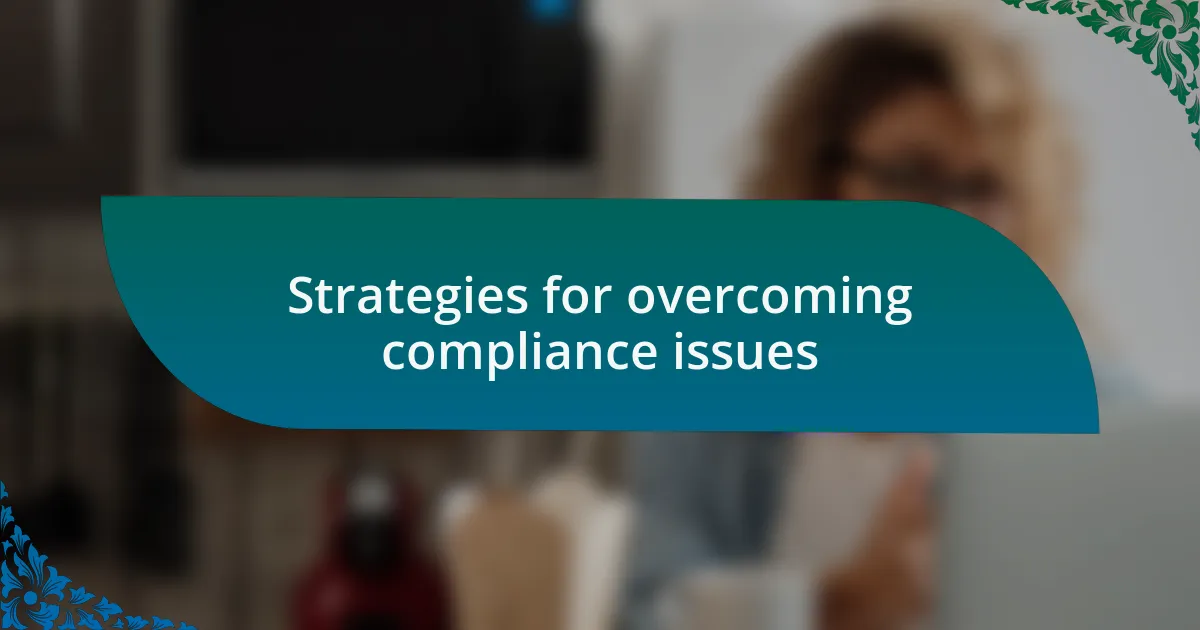
Strategies for overcoming compliance issues
When faced with compliance issues, I found that proactive training programs for my team were invaluable. I remember initiating workshops that simulated real-life compliance scenarios, which not only prepared us for potential hurdles but also fostered a sense of camaraderie. Isn’t it reassuring to know that, together, we can tackle these challenges head-on?
Another strategy that worked for me was establishing a compliance task force within our organization. I realized that having a dedicated group allowed us to stay ahead of regulatory changes and address compliance matters more effectively. I’ll never forget when this team pooled their knowledge to create a comprehensive checklist that streamlined our compliance processes—what a difference that made!
Lastly, I learned the importance of leveraging technology to enhance compliance tracking. For instance, implementing automated reporting tools not only lightened my workload but also increased accuracy in our compliance documents. It’s empowering to embrace technology, isn’t it? I found that these digital solutions provided real-time insights, allowing us to quickly adjust our strategies as needed.

Lessons learned from my experience
When it comes to compliance, I’ve learned that cultivating a culture of openness is essential. I once shared a challenging compliance document with my team, and instead of feeling overwhelmed, their genuine feedback helped refine our approach. It struck me how vital it is to foster an environment where everyone feels empowered to speak up—wouldn’t you agree that collaboration can turn challenges into opportunities for growth?
Another notable lesson was the significance of meticulous documentation. I remember a time when a seemingly minor oversight nearly caused a compliance issue that could have spiraled out of control. Since then, I’ve made it a priority to document every step we take, treating these records as vital references. Seeing these logs not only helps prevent future mistakes but also assures our stakeholders that we are committed to transparency. Isn’t it comforting to know that thorough documentation builds trust?
Lastly, I came to appreciate the power of continuous learning in this field. After attending a couple of industry conferences, I realized how quickly regulations can evolve and the critical importance of staying informed. Each session sparked new ideas on how to tackle compliance challenges, and I felt invigorated by the exchange of knowledge. In an industry that changes so rapidly, don’t you think it’s our responsibility to keep learning and adapting?